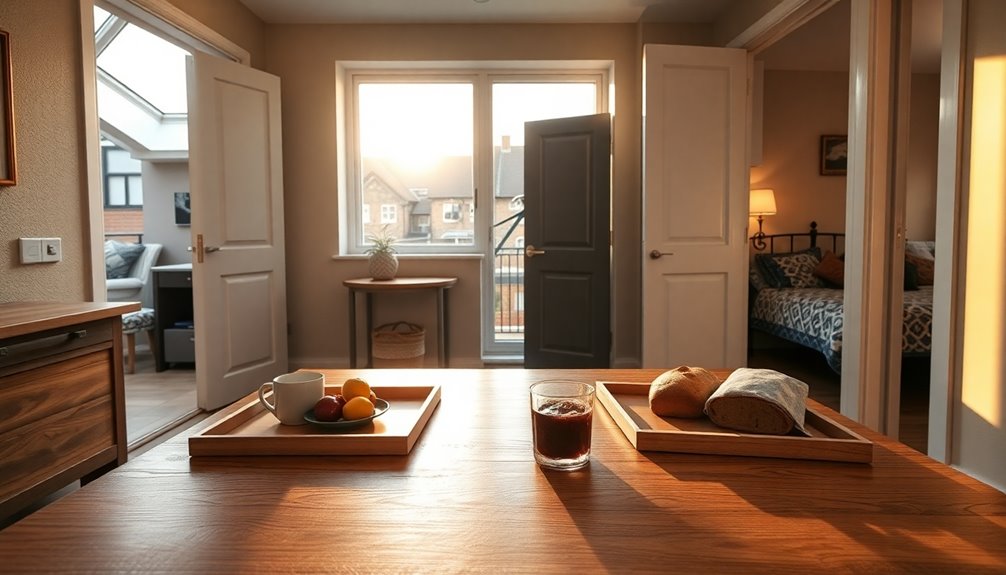
If you want an immersive, affordable stay in Dublin, homestays give daily English practice with friendly Irish hosts and easy access to schools and transport. Choose central neighborhoods like Rathmines, Ranelagh or Temple Bar for short commutes. Decide between private host families for quiet focus or shared student houses for social learning. Ask about meal times, house rules and transport links before you book. Keep exploring these options and you’ll find practical tips to pick the perfect match.
Why Choose a Homestay in Dublin for English Learning
Because you’ll be living with Irish hosts, a homestay in Dublin gives you everyday chances to use English outside class, from breakfast conversations to asking for directions, which speeds up your fluency and boosts your confidence. You’ll practice real speech patterns, slang, and pronunciation in natural settings, so language practice becomes part of your routine rather than a chore. Living with locals also opens doors to cultural exchange: you’ll share meals, stories, and customs that deepen your understanding of Ireland beyond textbooks. If you value freedom, a homestay lets you choose when to join family activities or explore solo, balancing immersion with independence. It’s an efficient, authentic way to grow your skills and experience Dublin life.
Top Neighborhoods for Student Homestays
Now that you know how living with Irish hosts accelerates language learning and cultural understanding, choosing the right neighborhood will shape your daily experience. You’ll want a spot that balances freedom with comfort: Rathmines and Ranelagh offer lively cafes, parks, and neighborhood amenities that let you explore independently. If you crave city buzz, stay near Temple Bar or St. Stephen’s Green for easy access to events and nightlife, while quieter suburbs like Drumcondra give calmer streets and good transport links. Each area delivers distinct cultural experiences — local markets, pubs with live music, galleries — so pick where your daily routine and social life align. Think about commute time to school and the vibe you want to wake up to.
Types of Homestays Available and What to Expect
You can choose between staying with a private host family, where you’ll get more one-on-one interaction and a quieter home environment, or joining a shared student household for a more social, independent experience. With a host family you’ll likely have meals and daily routines in common, while a shared house usually means private study space but shared chores and bills. Think about whether you want immersion and routine or flexibility and peer company when you pick.
Private Host Family
Private host families offer a personal, home-based immersion where you’ll live with Irish hosts who blend daily life with English practice. You’ll enjoy private family dynamics and genuine cultural exchange, while keeping freedom to explore Dublin on your schedule. Expect a private room, shared meals if you want them, and conversational practice over breakfast or evening tea. Hosts usually respect your study time and social plans, offering local tips and optional activities. This setup suits you if you value comfortable solitude plus authentic interaction.
| Feature | Typical Offer | Benefit |
|---|---|---|
| Room | Private | Quiet study space |
| Meals | Optional/shared | Flexible routine |
| Social | Host-led | Local insight |
| Rules | Moderate | Personal freedom |
Shared Student Household
If living with a host family felt too quiet or solitary, a shared student household gives you a more social, student-focused alternative. You’ll join a flat or house with other learners, sharing kitchens, bathrooms, and downtime while keeping your private bedroom. It’s perfect if you want independence without isolation: bills are usually split, cleaning rotas keep things fair, and everyone contributes to a friendly atmosphere. You’ll find study buddies, language exchange opportunities, and local tips from people in the same situation. Look for clear house rules on guests, noise, and chores before you move in. Shared living suits those who crave freedom, social life, and a genuine student community experience in Dublin.
Key Criteria for Selecting the Right Host Family
When choosing a host family, you’ll want to think about location and commute so you’re not spending hours getting to class. Consider how much English you’ll actually get to use at home and whether the family encourages conversation. Check their home rules and daily routine to make sure they fit your study schedule and comfort level.
Location and Commute
Because your daily routine will be shaped by travel time, choose a host family whose home keeps your commute to class and social activities reasonable; long or unpredictable journeys can eat into study time and make you tired. You’ll want easy access to public transport and local amenities so you can move freely, run errands, and explore without feeling tied down. Check travel times at different hours, nearby bus, tram or train links, and how often services run—freedom means flexible schedules. Also consider cycle lanes or walking routes if you prefer active travel. Ask hosts about typical commute patterns and any peak-time delays. Use this quick comparison to weigh options before committing.
| Distance to school | Transport links | Nearby amenities |
|---|---|---|
| 15–30 min | Tram + bus | Shops, cafés |
| 30–45 min | Bus only | Grocery, park |
Language Immersion Level
Think about how much English you’ll actually use at home—your host family’s attitude toward speaking English will make or break your immersion. You want a place where conversations, meals, and casual moments push you to speak, not slip into another language. Ask hosts about their English comfort level, whether they welcome corrections, and if they enjoy language immersion as a learning journey. Seek families keen on cultural exchange who invite you to share your traditions while encouraging theirs. Prefer hosts who include you in daily life—shopping, local events, or simple chats—so you can practice naturally. That freedom to speak and explore builds confidence faster than formal study alone, so pick a family that’s active, patient, and curious.
Home Rules and Routine
Good immersion depends on daily life, and that’s exactly why you should get a clear picture of a host family’s house rules and routine before you commit. You want boundaries that respect your independence while giving structure to your stay. Ask about visitors, curfews, kitchen access and laundry so you won’t clash with their daily rhythms. A good host shares routines but lets you choose your pace.
- Ask explicitly about quiet hours and overnight guests.
- Clarify meal arrangements and kitchen freedom.
- Know cleaning expectations and laundry schedules.
- Understand arrival/departure procedures and notice for changes.
Clear house rules tied to daily routines let you enjoy freedom without friction, making study and social life smoother.
Comparison of Popular Homestay Providers in Dublin

When you’re choosing a homestay in Dublin, it helps to compare providers on key factors like location, host vetting, inclusions (meals, Wi‑Fi, laundry), and price; doing so makes it easier to match your budget and lifestyle to the right option. Look at comparison factors such as host screening, homestay turnover, and cancellation policies. Check provider ratings from students for reliability, cleanliness, and cultural fit. Some agencies offer flexible cancellation and shorter stays, ideal if you want freedom to move; others lock you into longer terms but include meals and extras. Prioritise what matters most — neighborhood vibe, commute time, or host interaction — and use ratings and direct questions to narrow choices quickly.
Typical Costs, Inclusions, and Booking Tips
Now that you’ve compared providers, let’s look at what you’ll actually pay and what’s usually included. You’ll want clear expectations: typical prices vary by location, room type, and host — expect budget shared rooms to mid-range private rooms. Accommodation amenities often include laundry, Wi‑Fi, and weekday meals; premium hosts may add private bathrooms or transport help. When booking, prioritize flexibility and transparent cancellation.
- Check total weekly/monthly rates (don’t forget deposits).
- Confirm which accommodation amenities are in the contract.
- Ask about guest policies, arrival times, and extra fees.
- Use reviews and direct host communication to secure freedom-friendly options.
Book with clear cancellation terms so you can change plans without friction.
Preparing for Cultural Differences and Daily Life in a Homestay
Because you’ll be living in someone else’s home, it’s important to learn basic Irish household norms and be ready to adapt: ask about meal times, quiet hours, shower schedules, and whether shoes are worn indoors; respecting these small rules makes daily life smoother and shows appreciation for your host. You’ll want to balance independence with openness: cultural adaptation is about curiosity, not surrender. Ask questions, offer help, and set boundaries kindly so daily interactions stay easy. Below is a simple guide to common expectations:
| Topic | Typical Expectation | How to Respond |
|---|---|---|
| Meals | Family eats together | Ask meal times |
| Noise | Quiet after 10pm | Use headphones |
| Cleaning | Shared chores | Offer to help |
| Guests | Ask first | Clarify visits |
| Privacy | Knock first | Respect doors |
Some Questions Answered
Are Homestays Available for Adults Over 60?
Yes — you can book homestays for adults over 60; you’ll find senior accommodations that respect independence, and you’ll join community engagement activities, letting you explore Dublin freely while enjoying supportive, sociable home environments tailored to seniors.
Can I Request a Smoke-Free but Pet-Friendly Home?
Yes — you can request a smoke-free but pet-friendly home. Imagine the relief: many hosts list smoke free options and clear pet policies, so you’ll freely enjoy a clean air space while embracing animal companionship.
Do Hosts Provide Workspace for Remote Study or Work?
Yes — many hosts provide dedicated workspace amenities and a quiet study environment; you’ll find desks, reliable Wi‑fi, and lamped areas, and you’re free to choose homes that support productive remote study or flexible work routines.
Is There Reliable Public Transport Late at Night From Homestays?
Yes — about 24% of Dublin bus and tram services run overnight, so you’ll usually find night transport options; you’ll want to plan routes and check schedules to avoid safety concerns while keeping your independent travel flexible and free.
Can Hosts Help With Part-Time Job or Internship Applications?
Yes — many hosts can offer job search assistance and internship guidance, sharing local contacts, CV tips, and interview prep. You’ll get flexible support while you explore opportunities independently, keeping your freedom to choose and pursue.
